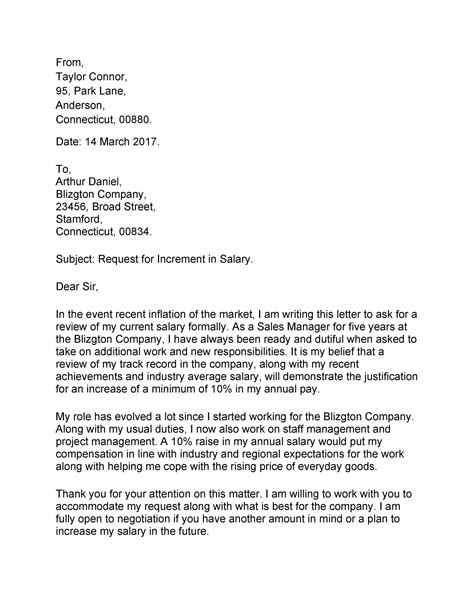Crafting A Letter For A Pay Raise Request: Expert Tips In English

Asking for a pay raise can be a daunting task, but it’s an important step in advancing your career and improving your financial situation. In this post, we’ll share expert tips and strategies to help you craft a compelling letter that will increase your chances of getting the raise you deserve.
1. Do Your Research
Before drafting your letter, it’s important to gather information about your company’s policies, industry standards, and your own performance. Here are some key points to consider:
- Company policies on pay raises and promotions
- Industry benchmarks for your job title and experience level
- Your job responsibilities and accomplishments
- Your performance reviews and feedback from colleagues and supervisors
2. Choose the Right Timing
Timing is crucial when it comes to asking for a pay raise. You want to choose a time when your supervisor is most likely to be receptive and when you have a strong case for why you deserve a raise. Here are some factors to consider:
- The company’s financial situation and budget cycles
- Your own performance and accomplishments
- Your supervisor’s availability and workload
- The company’s recent successes or challenges
3. Frame Your Request in the Right Way
The way you frame your request can make a big difference in how it’s received. Here are some tips:
- Avoid making demands or ultimatums
- Focus on your contributions and value to the company
- Be specific about the amount you’re requesting and why
- Use positive language and express gratitude for your job
4. Provide Evidence and Examples
To support your case for a pay raise, you’ll need to provide evidence and examples of your performance and contributions. Here are some ways to do that:
- Quantify your accomplishments with specific numbers and metrics
- Provide positive feedback from customers or colleagues
- Highlight any awards or recognition you’ve received
- Show how your work has contributed to the company’s success
5. Follow Up and Be Patient
After you’ve submitted your letter, it’s important to follow up with your supervisor to show that you’re serious about your request. Here are some tips:
- Arrange a meeting to discuss your request in person
- Show enthusiasm and commitment to your job
- Be patient and understanding if your request is denied
- Ask for feedback and suggestions for improvement
6. Conclusion
Asking for a pay raise can be nerve-wracking, but with the right approach, you can increase your chances of success. By doing your research, choosing the right timing, framing your request in the right way, providing evidence and examples, and following up, you can make a strong case for why you deserve a raise.
7. FAQs
Q: How often should I ask for a pay raise?
A: It depends on your company’s policies and your performance. Generally, it’s appropriate to ask for a pay raise once a year or after you’ve achieved a significant accomplishment.
Q: What if my supervisor denies my request?
A: If your supervisor denies your request, ask for feedback and suggestions for improvement. Consider whether there are other ways you can increase your income or advance your career within the company.
Q: Should I mention personal or financial problems in my request?
A: No, it’s best to focus on your contributions and value to the company rather than your personal or financial situation.
